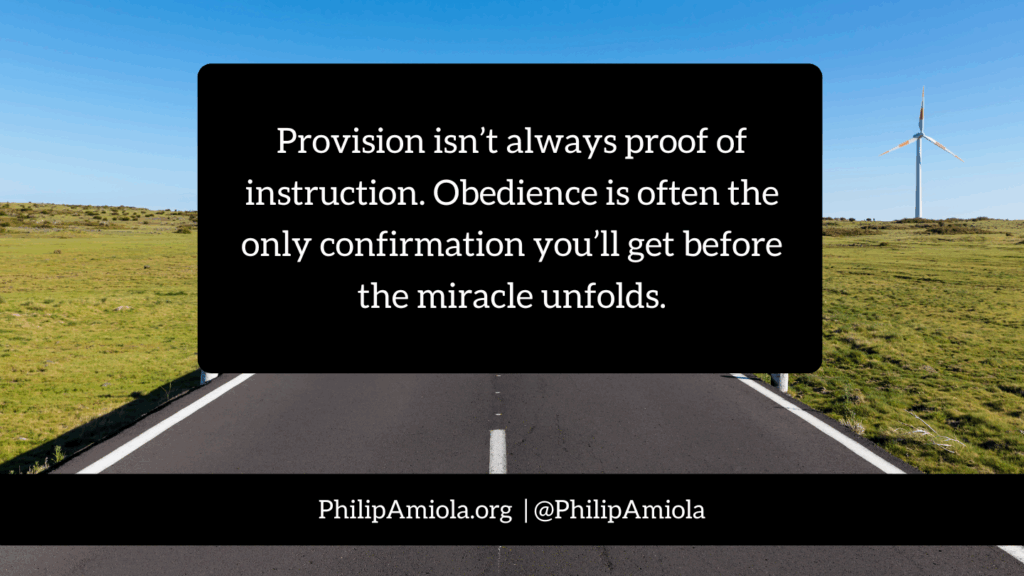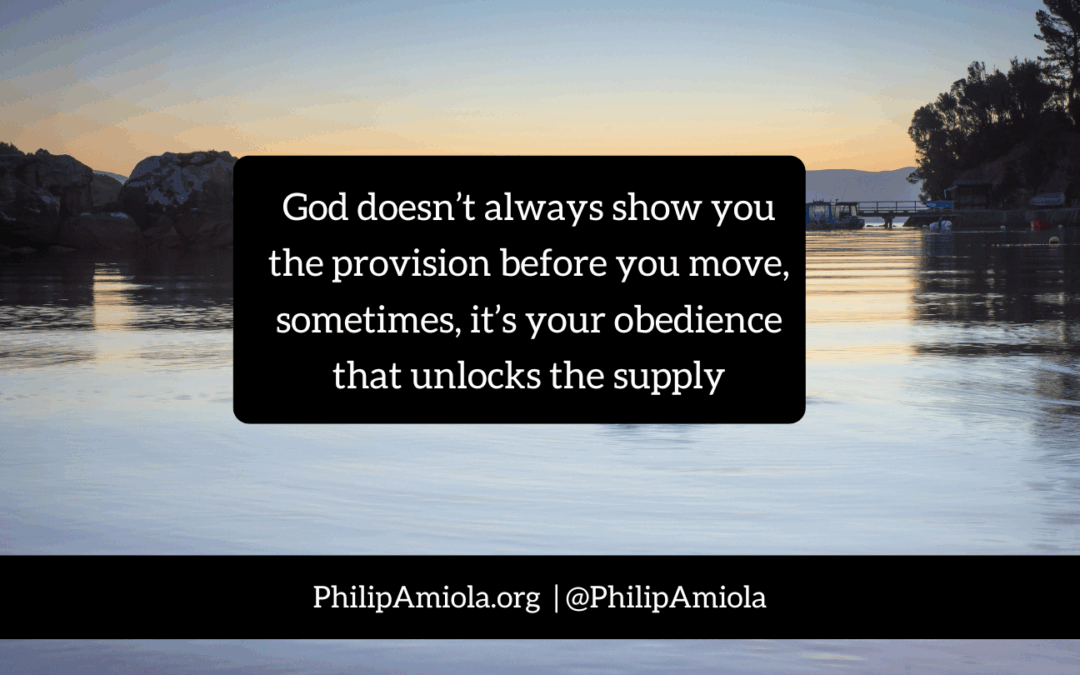How to Recognize God’s Supply in Everyday Life
“When I sent you without purse, bag or sandals, did you lack anything?”
“Nothing,” they answered.
— Luke 22:35 (NIV)
It’s easy to trust God when your salary is flowing, your business is booming, and your pantry is full. But what about when the numbers don’t add up? What happens when you feel deeply called to do something for God—and you don’t see where the provision is going to come from?
I remember reading that question Jesus asked His disciples and pausing over their simple, confident response: “Nothing.” Not a single thing was missing. No unpaid bills. No skipped meals. No sleepless nights wondering how it would all work out.
That verse has followed me for years, showing up at the exact moments I’m tempted to believe that provision depends on effort, hustle, or strategy. And I get it—we’re wired for self-reliance. In today’s world, “God will provide” often feels like a vague spiritual slogan, not a practical financial plan. But maybe that’s exactly where the problem lies.
Because when God sends, He also provides.
Not always in the way we expect. Not always in the form we prefer. But always, faithfully, and often creatively.
Feeling called but unsure how you’ll afford it? When God sends you, He also provides. Share on XLet’s Talk About Ministry (and Where We Get It Wrong)
When most people hear the word ministry, they picture a stage, a microphone, maybe a prayer line or a neatly designed flyer for an upcoming program. What they don’t picture is a graphic designer meeting a deadline, a teacher showing up early for a struggling student, or a freelance writer submitting work that brings clarity and hope.
But ministry, at its core, is meeting the needs of others with the resources God has provided. That includes finances, yes—but also wisdom, insight, relationships, skills, creativity, and favor.
Somewhere along the line, many of us started believing that real ministry required a donor list, a GoFundMe page, or a generous salary from a church. And while God certainly uses financial gifts, provision doesn’t start with people. It starts with Him.
Not Everything That Glitters Is Grace
Let’s be honest: sometimes we confuse grace with gimmicks.
We put together polished presentations, launch complex fundraising strategies, or lean too heavily on people’s generosity, hoping that if we look “called” enough, the money will follow. And sometimes it does, but not always in a way that brings peace.
There’s a subtle danger in treating provision as a performance. It turns ministry into a transaction. Instead of seeking God for what we need, we start seeking people—and eventually resenting them when they don’t respond.
Here’s a better approach: Ask God first. Watch for His supply. Trust the channel He chooses.
Because when the source is right, the supply is steady.
The “Worthy Man” Principle
When Jesus sent out His disciples in Matthew 10, He gave an unexpected set of instructions:
“Whatever town or village you enter, search there for some worthy person and stay at their house until you leave.”
— Matthew 10:11 (NIV)
He didn’t tell them to take money, luggage, or even a backup plan. He told them to go empty-handed—but not helpless. Because the assignment came with an assurance: provision would be found on the path of obedience.

Now, the phrase “worthy man” might sound outdated or cryptic. But in modern terms, it simply means the place or person God has prepared in advance to sustain you while you serve.
It could be a job.
A client.
An organization.
A business deal.
A partnership.
Whatever it is, your “worthy man” is not just a source of income—it’s a channel of divine provision. And once you find it, Jesus said to stay there. Don’t hop from opportunity to opportunity in fear or greed. Don’t chase the next shiny thing. Settle in. Serve well. And let God meet your needs through that house.
Real Life: Modern Provision Stories
Maybe you’re a web developer, and your “worthy man” is a nonprofit client whose project not only pays your bills but also helps amplify voices you care about.
Maybe you’re a stay-at-home parent, and your “worthy house” is your home, where you shape young minds while managing a side hustle that quietly funds a local outreach.
The ‘worthy man’ in your life may not look spiritual—but they’re part of your spiritual supply chain. Share on XMaybe you’re in corporate HR, and your “worthy man” is your manager who creates space for you to mentor others on the job—giving you both income and influence.
The channels may look different, but the principle is the same: provision flows where God has planted you.
Don’t Dismiss the Job That Feeds Your Mission
There’s a growing mindset among some believers that full-time employment is somehow less spiritual or even a barrier to ministry. But Paul made ‘tents’. Jesus worked as a carpenter. Lydia ran a business. Priscilla and Aquila were entrepreneurs who hosted church in their home.
Scripture is filled with people who served God deeply without ever abandoning their profession. They didn’t despise the job that funded the mission—they stewarded it.
So if your 9-to-5 is currently paying your bills and giving you margin to serve others, that’s not a compromise. That’s provision.
Don’t rush out of it just because it doesn’t look like “ministry.” Stay until God says move.
Don’t mistake a job, client, or contract as ‘just work.’ It might be the very ‘house’ God has assigned. Share on XWhat Provision Really Means
Provision is not just about money. It’s about having what you need to do what God has asked you to do. That might include:
- Wisdom to make good decisions
- Energy to show up consistently
- Relationships that open doors
- Tools that make your work effective
- Peace that sustains your emotional health
- And yes, finances—sometimes through expected means, sometimes through surprises.
The challenge is to look for provision in all its forms, not just the obvious ones. And to recognize when something is grace—not just luck or coincidence.
What About Seasons of Lack?
Let’s be real: sometimes the math doesn’t add up. You feel called. You’re showing up. But the bank account is tight. The opportunities feel few. And you start to wonder if you missed a step.
Here’s what I’ve learned: lack doesn’t always mean disobedience. Sometimes it’s a season of pruning. Sometimes it’s a test of faithfulness. And sometimes, it’s preparation for provision that’s just around the corner.
Remember Elijah? God told him to go to a brook called Cherith, where he’d be fed by ravens. Later, the brook dried up. Not because Elijah disobeyed but because it was time for the next place, the next provision.
Sometimes the source dries up because it’s time to move—not because God stopped providing. Share on XSo don’t panic when one source dries up. Ask God, “Where is my next worthy man?” He will always provide—sometimes in a new way, but always on time.
Practical Steps for Living in God’s Provision
If you’re trying to discern where provision fits into your calling, here are a few things that have helped me (and might help you too):
1. Pray Before You Pivot
Don’t make moves out of fear or frustration. Ask God for clarity about where He wants you to be—and what He’s already provided there.
2. Identify Your Current Channels
List out the jobs, clients, relationships, or spaces that are meeting your needs. Could one of them be your “worthy house”?
3. Resist the Urge to Chase Every Opportunity
Just because it pays more doesn’t mean it’s provision. Stick with what brings peace and purpose.
4. Trust That God Knows What You Need
Sometimes He’ll provide just enough. Other times He’ll surprise you with more than enough. Either way, trust His timing.
5. Be Open to Unconventional Sources
Ravens. Widows. Clients you never expected. God has a history of using the unexpected.
A Word of Encouragement
Here’s what I want you to hear loud and clear:
You are not your own provider. God is.
Your calling may take you into unfamiliar territory, but you won’t walk it alone. Provision is part of the promise. When He sends you, He already knows what you’ll need. And He’s gone ahead to make it available—through jobs, clients, relationships, and resources you may not even see yet.
So breathe. Take a step. Ask Him for your daily bread. And trust that when you look back—just like the disciples—you’ll be able to say, with confidence:
“I lacked nothing.”

